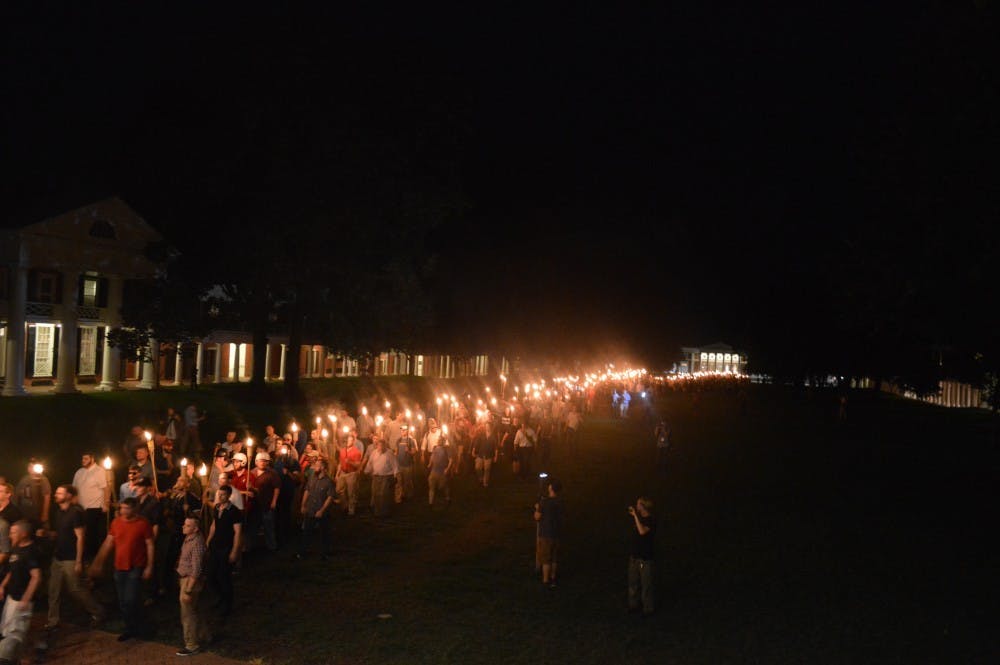The University never forgets April 13. Each year, the University commemorates Jefferson’s birthday with ceremonies, celebrations and other traditions to recognize and re-evaluate its founder’s legacy. While there’s nothing inherently wrong with commemorating Thomas Jefferson and his work at the University, the indomitable consistency of our Founder’s Day celebrations should prompt us this year to consider other days worthy of the same dependable collective action.
As we approach the one-year anniversary of last August’s white supremacist rallies in Charlottesville, we owe it to ourselves and our community to remember “Unite the Right” and recommit ourselves to resisting such bigotry in the future. Just as our actions on Founder’s Day prolong our conversations about Jefferson and his legacy, so too must we act again on Aug. 11 and 12 to remember Charlottesville’s failings and to fight for its future.
Many of the University’s Founder’s Day activities –– recognized since its first academic session –– take on an admittedly celebratory tone. Along with the Thomas Jefferson Foundation at Monticello, the University presents Thomas Jefferson Foundation Medals in Architecture, Law and Citizen Leadership each April 13. The University plants a tree to honor a community member, and even the infamous Society of the Purple Shadows procession connotes a communal reverence for Thomas Jefferson.
In recent years, Founder’s Day has also offered opportunities to criticize Jefferson’s legacy and engage in difficult conversations about his controversies. This year’s Jefferson Society Founder’s Day Dinner, for example, will feature Dean Kirt von Daacke as its keynote speaker. As the Co-Chair of the President's Commission on Slavery and the University and Co-Founder of the Jefferson's University — Early Life Project (JUEL), Dean von Daacke will focus on how we should interpret and remember the complete legacy of Thomas Jefferson.
In the year following the horrific events of the past summer, it’s become all too easy to use “Aug. 11 and 12” as buzzwords or to bend any University issue back to the Unite the Right rallies. While I’m aware of the danger of making either of those mistakes in this article, I’d like to argue that the one-year anniversary of Aug. 11 and 12 remains genuinely relevant to the 275th anniversary of Jefferson’s birth. First, more modern Founder’s Day iterations offer a model for how to look critically at things like Jefferson’s legacy that are central to our University and unsettling. And second, Founder’s Day reminds us of what the University chooses to revere and all the issues that might offer better objects of that reverence and that critical perspective.
In a community so thoroughly inundated with Jefferson’s name, quote, and visage, the urgency with which we celebrate Jefferson each April can take on an almost comical exorbitancy. All the energy devoted to remembering Jefferson should clue us into all the less-thoroughly commemorated aspects of the University’s history. Founder’s Day, then, shows us how to engage with our history while making us skeptical about limiting that engagement to Jefferson alone.
The one-year anniversary of Aug. 11 and 12 is fast approaching, and it seems clear that such an anniversary deserves our full engagement. The deadly events of Aug. 11 and 12 made “Charlottesville” a global synonym for white supremacist violence, and may have radically redefined the University for its third century. Other aspects of the upcoming summer make our approach to the anniversary even more critical. The neo-Nazis and white supremacists who stormed Charlottesville have been planning a follow up rally in 2018 since late last year. Though the City of Charlottesville denied rally organizers’ initial requests for event permits in December, the alt-right leader Jason Kessler is suing Charlottesville for its denial. Whatever the results of the suit, it seems unlikely that last summer’s bigoted demonstrators –– who have already returned once to Charlottesville this year –– will be able to resist returning to the city in August to renew their commitment to violence and terror. Moreover, we must remember that the University has not yet decided how to deal with the upcoming anniversary. No decision has been made about the type or degree of action the University should take on those days. In the face of one of the most important anniversaries in University history, we still don’t know how we’ll respond.
Let’s decide now. Founder’s Day is a little hokey –– it’s a little overblown and a little too much “TJ” at the University that can’t get enough of him. But at the end of the day, it’s a form of dedication to our history and to wrestling with our complicated, controversial past. This Founder’s Day, let’s commit to applying these same principles to the dates that matter so much more for the University’s present moment. Commit to coming back to Charlottesville on Aug. 11 and 12. Commit to protesting if you can. If you can’t, commit to another form of demonstration or to attending community events or to gathering in some way so as to be present here––so as to mark those dates indelibly on our collective calendars and, in doing so, to reflect on and resist the systemic failures that permitted those rallies in the first place. Move on from Jefferson and remember that we have a more modern history whose recognition and interrogation have barely yet begun.
Jack Chellman is an Opinion Columnist for The Cavalier Daily. He can be reached at opinion@cavalierdaily.com.





